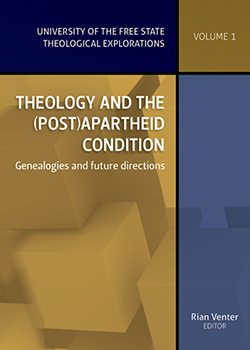Latest News Archive
Please select Category, Year, and then Month to display items
14 November 2024
|
Story André Damons
|
Photo André Damons
 Staff members from the Directorate Research Development (DRD) at the University of the Free State; Palesa Mgaga, second from right, Tebogo Machethe, centre, and Charelise van Staden, second from right, were thanked for hosting the launch of the Khoebo Innovation Promotion Programme. They are pictured with colleagues from the IDC’s Samkelisiwe Mtsewu, left, and Thato Mogopodi, far right.
Staff members from the Directorate Research Development (DRD) at the University of the Free State; Palesa Mgaga, second from right, Tebogo Machethe, centre, and Charelise van Staden, second from right, were thanked for hosting the launch of the Khoebo Innovation Promotion Programme. They are pictured with colleagues from the IDC’s Samkelisiwe Mtsewu, left, and Thato Mogopodi, far right.
The University of the Free State (UFS), represented by the Directorate Research Development (DRD), played host to the Department of Trade Industry and Competition (dtic) and the Industrial Development Corporation (IDC) for the launch of its Khoebo Innovation Promotion Programme (KIPP).
The launch took place on 5 November in the Sasol Library on the Bloemfontein Campus. Tebogo Machethe, Director: Research Contracts and Innovation at the DRD, said its role was to expose the university researchers to different opportunities and programmes for funding from the IDC and the dtic. It also allowed the researchers to engage potential funders in order to understand what funders look for in a project when considering funding it.
“The aim of IDC KIPP is to assist local entrepreneurs and small to medium enterprises with commercialisation funding. The KIPP offers capital and business support to SMMEs during the early stages of commercialisation with particular emphasis on township and rural entrepreneurs,” said Machethe.
Address uneven distribution of economic development
KIPP is a dtic programme but is managed by the IDC and aims to enable early-stage innovative SMEs to penetrate the market with their locally developed innovations, resulting in a more competitive economic environment and thereby facilitating economic growth in the economy.
According to Machethe, who welcomed the guests, participants and presenters to the launch, some of the funding is geared towards the development of university innovations. Though the focus was on the KIPP launch, he continued, the discussions also encompassed other forms of funding that are available and more geared towards the university innovation.
His address was centred around the university's Vision 130 and how it supports innovation and the entire innovation ecosystem, which seeks to shift the emphasis to research impact, embracing both knowledge and societal impact. Vision 130 identifies the need for a greater focus on collaborative research, research that can attract large-scale funding in niche areas where the university is seen as a national and global leader.
Samkelisiwe Mtsewu, KIPP Account Manager at the IDC, said the programme was introduced to address the uneven distribution of economic development across the country. She said with its capacity, the KIPP programme can contribute to addressing the uneven distribution of economic development.
UFS research project aims to stimulate reflection on theological studies
2017-06-20

The first book in the ‘UFS Theological
Exploration’ academic series, called Theology
and the Post(Apartheid) Condition, has just
been released.
Photo: Supplied
The first study book with the title Theology and the Post(Apartheid) Condition, which is part of a new academic series by the Faculty of Theology and Religion at the University of the Free State, is now available. Volume 1, compiled by Professor Rian Venter as editor, is the first book in the ‘UFS Theological Exploration’ academic series, which the faculty plans to release.
Transformation
Professor Venter says the transformation of processes and practices in communicating and creating knowledge has become an urgent task for public universities in a democratic South Africa. Much reflection has already gone into the methods and scope of transformation in higher education.
Although the faculty has done work on the implications of this for theology, there is one area of investigation that has not received much attention. It concerns the role of theological disciplines such as Old and New Testament, Missiology and Systematic Theology and Practical Theology, and specifically the relationship between academic disciplines and societal growth. The book focuses on these challenges and contains the intellectual undertakings of the contributors who are all lecturers, research fellows and post-graduate students linked to the faculty.
The questions
The key questions addressed are: what are the contours of the (post)apartheid condition and what are the implications for responsible discipline practices in theology. Professor Venter says the chapters in the book are logically arranged and moves from wider to more specific concerns. The first three chapters suggest broad perspectives on the challenges for theology in higher education, chart the changes, and make some suggestions for the future.
A dynamic field of study
The book states that theology has already experienced profound and radical changes over the past decade, which is known to us. All the chapters demonstrate these fundamental shifts, which have taken place in all theological sub-disciplines. Professor Venter says the contributions in the book illustrate that theology is a dynamic field of study, and is pursued with enthusiasm and commitment. Not all disciplines in theology are investigated for the book. However, the studies reflect the interests of the theologians in the Faculty of Theology at the UFS. Professor Venter hopes that the volume might stimulate further reflection of a similar nature by other theologians.
New insights
Through the ‘UFS Theological Exploration’ research series, the faculty hopes to stimulate new insights and new developments in academic progress and overall human growth. Series editor Professor Francois Tolmie says it is a fact that strong university research is necessary to achieve academic progress and advance human prospering. He says the faculty's research series will make a valuable contribution to these causes. Professor Tolmie says the ‘UFS Theological Explorations’ contains research of the highest academic standard which has been peer-reviewed to make significant educational contributions to core theological issues in South Africa and overseas.